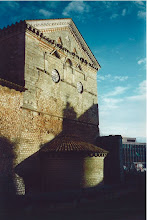Thanksgiving

I bow down to Thee, O Master; I bless thee, O Good One; I beseech Thee, O Holy One; I fall down before Thee, O Lover of mankind; and I glorify Thee, O Christ; for Thou, O Only-begotten master of all, O Only Sinless One, wast, for the sake of me, an unworthy sinner, given up to death on the cross in order to free the soul of a sinner from the bondage of sin.
And how shall I repay Thee, O Master? Glory to Thee, O Lover of mankind! Glory to Thee, O Merciful One! Glory to Thee, O Longsuffering One! Glory to Thee, Who forgivest every fall into sin!
Glory to Thee, Who didst descend to save our soul! Glory to Thee, Who didst take flesh in the womb of the Virgin! Glory to Thee, Who didst suffer bondage! Glory to Thee, Who didst accept scourging! Glory to Thee, Who was made an object of humiliation! Glory to Thee, Who wast crucified! Glory to Thee, Who was buried!
Glory to Thee, Who didst rise from the dead! Glory to Thee, of Whom the prophets spoke! Glory to Thee, in Whom we have believed! Glory to Thee, Who didst ascend into heaven! Glory to Thee, Who didst sit with glory at the right hand of the Father and Who art coming again with hosts of angels to judge every soul that has scorned Thy holy passion!
In that anxious and dreadful hour when the heavenly powers are roused, when all the angels, archangels, seraphim and cherubim will stand with fear and trembling before Thy glory, when the foundations of the the earth will be shaken, and when all that breathes will be terrified by the incomparable greatness of Thy Glory--in that hour mayest Thou take me under Thy wing and may my soul be delivered from the terrible fire and from the gnashing of teeth, from outer darkness and eternal lamentation, that I may bless Thee and say: Glory to Him Who has desired to save a sinner according to the great compassion of His mercy!
- St. Ephraim the Syrian, a Spiritual Psalter, No. 2

